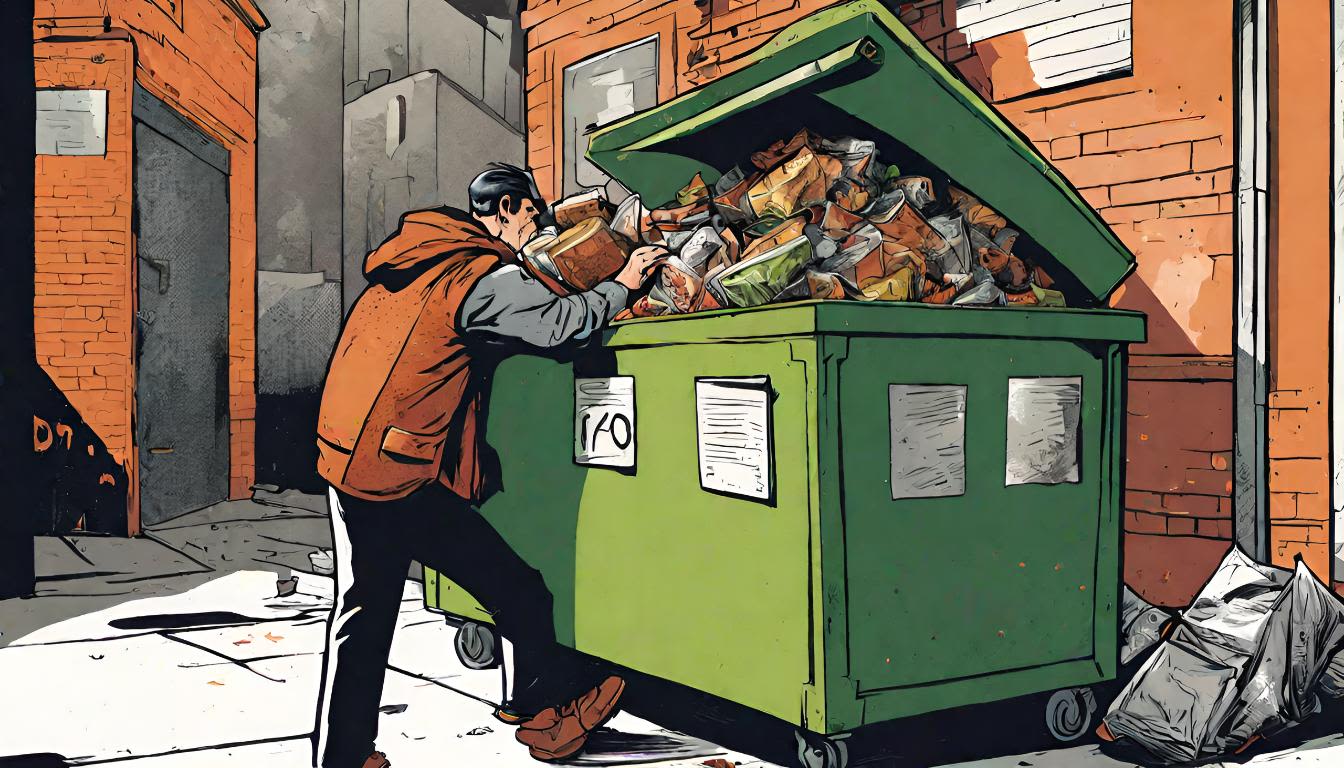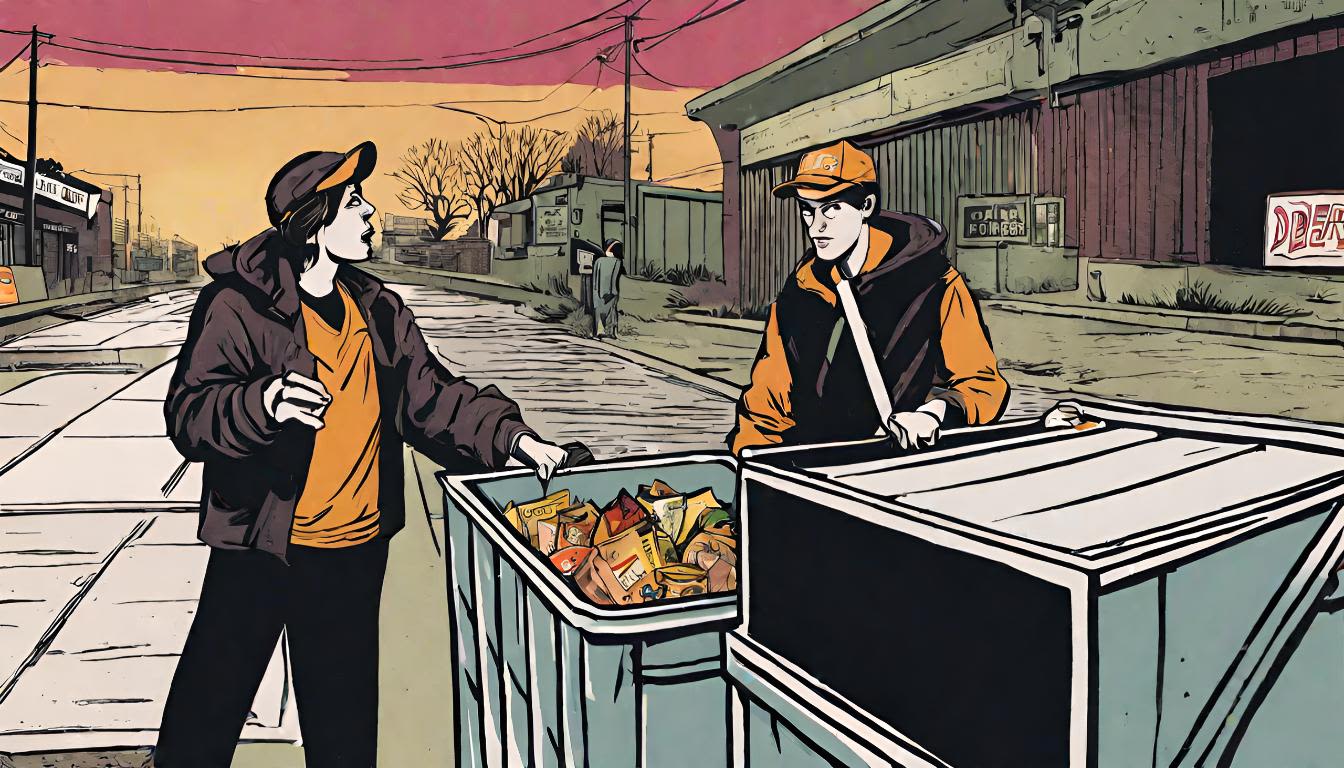Bins, buffets, and battle cries: Inside the grim world of dumpster diving

Disposable culture is drowning us in waste. Meet the modern-day Robin Hoods salvaging the UK’s ‘degraded’ bounty to spur change within the retail landscape.
“Eat trash!” rages Oscar* before diving feet-first into a garbage bin to forage his dinner. The former truck driver has been recycling this catchphrase since 2016, when he started noticing the shocking amount of goods discarded by the stores he usually delivered to.
“At first, I used to walk by the skips and glance in to ‘accidentally’ find something of value,” he recalls. After a few unsuccessful trips, he struck his first-ever dumpster gold: two Bob Ross-style paintings that still hang in his room today.
“I slowly discovered all the food that gets tossed out of supermarkets,” Oscar continues. “From then on, garbage has been feeding me and everyone I care about.”
As of November 2023, the Department for Environment, Food and Rural Affairs (DEFRA) collected 73 per cent more waste from across the UK than the previous year.
Currently, 16 per cent of this tonnage is being sent to landfills.
While 50 per cent is buried or burned – the least sustainable options at the bottom of the waste disposal hierarchy.
Additionally, the Waste and Resources Action Programme (WRAP) estimated food waste arising in the UK in 2021 at 10.7 million tonnes. That’s enough food to fill 16 Wembley stadiums.
These figures are also recorded at a period when 17 per cent of households (9 million adults) are experiencing food insecurity across the country.
Paired with income inequality, climate catastrophe and a cost of living crisis, there has never been a more topical time to discuss food and retail waste management.
Food waste and food insecurity (UK, 2018-2021). Line chart by Malavika Pradeep
For dumpster divers like Oscar, the UK’s ‘degraded’ bounty offers an endless buffet that they share with their community – empowering them to call out corporations in hopes of spurring change within the retail landscape.
Every dumpster haul (or ‘hauldi’, if sourced from the bottomless bins of an Aldi) posted on TikTok, Facebook groups and subreddits like r/DumpsterDiving is a call to arms. The divers are nothing less than modern-day Robin Hoods, except they don’t steal but merely re-purpose products destined for landfill.
“I started dumpster diving as an almost visceral reaction to waste,” says Hammy*, the admin of a popular diving community on Facebook. “When I look in a dumpster and see something in perfect condition, the thought of leaving it behind and not reaching in to get it feels criminal and grossly immoral.”
With 13,000 members and counting, the Facebook group constantly upload their hauls while sharing tips on diving in local areas. Hammy also keeps an updated list of community kitchens and food banks for participants to donate their extra finds.
“We’ve definitely witnessed a surge in new members after the COVID-19 pandemic,” the admin shares.
Responses collected from r/DumpsterDiving. Visual by Malavika Pradeep
Meanwhile, Paula – a mature student with a degree in health and social care – confirms that the cost of living crisis has made dumpster diving a necessity for those in her neighbourhood.
“My husband and I see more people doing it, mostly in local bins that have an abundance of wasted food,” she admits, adding that everyone she has met in the community has been friendly and operates on an unwritten code of conduct.
“If we drive to a bin and someone else is already there, we just come back later or move on to the next one.”

Although dumpster diving has forged one of the warmest communities with roots in freeganism, an ideology that involves reclaiming discarded products to limit one’s consumption, it’s still a legal grey area.
In 2013, three men were arrested in Kentish Town and charged under the 1824 Vagrancy Act for dumpster diving at the back of an Iceland store. However, the Crown Prosecution Service dropped the case following a wave of criticism.
“Dumpster diving is not illegal in any way, shape or form in the UK, and I’ve even had police come up to me,” Paula states. “As long as you don’t leave a mess, they don’t care.” On the other hand, Oscar believes that the circumstances depend on “what cop shows up and what he thinks he has to prove or not.”
“Where I live, an employee is supposed to ask you to leave before calling the cops. But it doesn’t always work that way,” Oscar continues. Hammy adds that diving is only considered illegal on premises with ‘No Trespassing’ signs.
“But signs are also not worth the ink they’re printed on,” the enthusiast claims. “Only an owner can tell you to leave, not a board.”
Apart from the vague legal clauses shrouding the practice, corporations deliberately subject dumpster divers to health and safety hazards while discarding their products. In the past, Iceland staff have been accused of pouring bleach onto waste food “to stop homeless people from eating it”, as reported by The Telegraph.
Several divers on TikTok have also found luxury fashion brands like Michael Kors shredding their products before binning them.
In 2016, France became the first country in the world to ban supermarkets from destroying unsold products to deter foragers. The law also forced shops to donate food to charities instead of binning them.
Dumpster diving sites across the UK. Locations sourced from dumpstermap.org. Interactive map by Malavika Pradeep
In the UK, one of the major factors that pushes stores to purge their stock is the difference between ‘best before’ and ‘use by’ dates.
“A ‘best before’ date is all about peak freshness and avoiding lawsuits rather than food safety,” Oscar explains. “Most supermarkets I dive at throw red meat days before their ‘use by’ date. But nobody I know has fallen ill by consuming them.”
Last year, Oscar even started seeing ‘display until’ labels in Sainsbury’s that made him lose faith in humanity.
In the first half of 2023, Sainsbury’s claims to have redistributed over 4,000 tonnes of food waste to charities. “We’re proud that we’ve sent zero waste to landfill since 2013,” it stated in a recent report. Lidl further detailed that it has reduced food waste by 43 per cent since 2016, while Aldi noted that only 0.50 per cent of its food handled ended up in landfills in 2022.
But the amount of Lurpak butter and frangipane mince pies being pulled out of their dumpsters weave a different story.
“Throwing food is easier for supermarkets than donating to the less fortunate,” Hammy says. “Sometimes I think it’s out of spite: ‘If it’s not sold, then no one can have it because we haven’t made money on it’.” While Oscar urges better staff training, Paula calls for sustainable stock rotations.
“It’s not easy being a diver. Some might enjoy the thrill of the hunt, but we all return with doomed views of our economy.”

Although disposable culture is drowning us in waste, the urge to consume seems limitless. “Dumpster diving will be around as long as we have dumpsters,” Oscar adds. “So, if something looks good, eat it.”
* Names have been changed to protect the privacy of some individuals